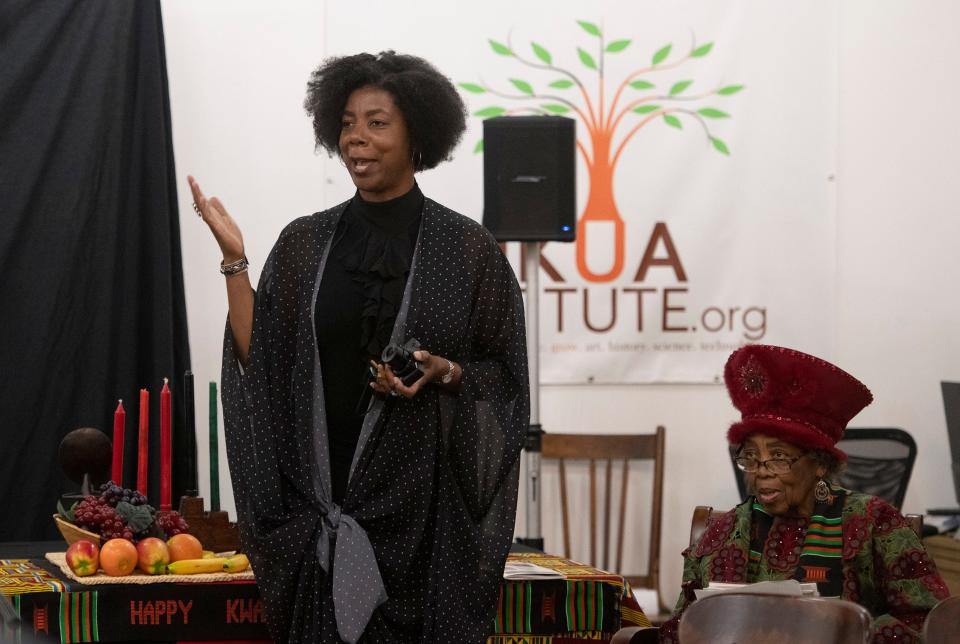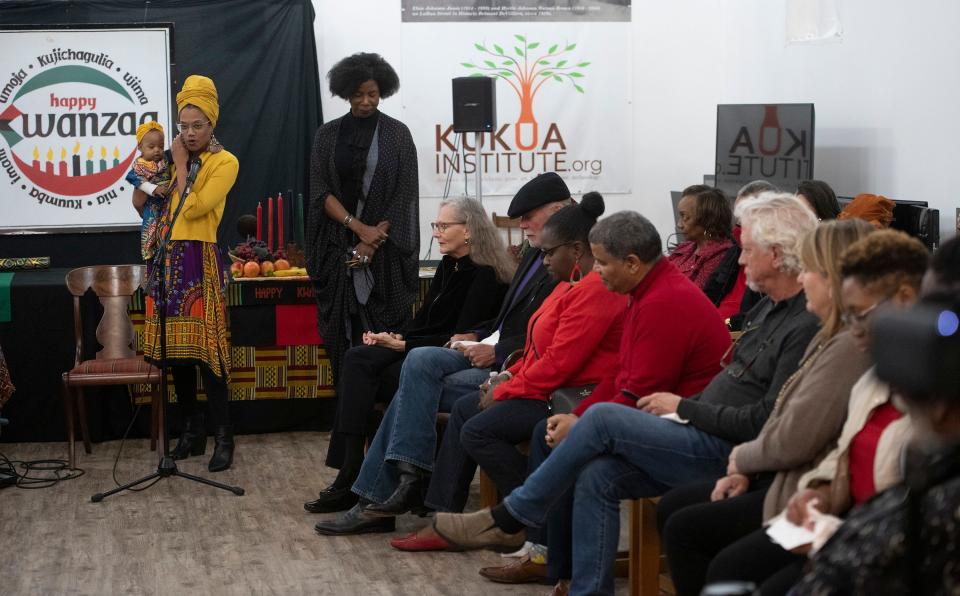Kwanzaa started in Pensacola to 'do better for ourselves, and make our community better'
- Oops!Something went wrong.Please try again later.
Community members gathered together Thursday night to celebrate and practice one of the well known African-American and Pan-African holidays − Kwanzaa −at the KuKua Institute.
“We as a community, an African American community, but even as a community, it's good to see a mixed crowd here tonight because they need to be educated on why we celebrate being African-Americans and from African descent. It's not just a religious holiday,” said Gloria Clay, one of about 40 “Reconnection: A Celebration of Kwanzaa” attendees.
Clay has celebrated Kwanzaa for nearly 40 years and her family decorates their home with all the symbols and candles every year, lighting each one every day of the celebration. Even her son, who is 30 years old, comes to his parents home every day during Kwanzaa to light the candles and reflect on the principles and what it means in their lives.
More: Chappie James flight AcademyChappie James Flight Academy soaring even higher thanks to $25,000 gift
More: KuKua InstituteLearning history from a robot: Kukua Institute's summer program will blend past and future
Kwanzaa, in the eyes of many who take part in it, is more of a celebration than a holiday of African-American culture and people.
It was created by Maulana Karenga, professor and chairman of Black Studies at California State University, in 1966. Karenga searched for ways to bring African-Americans together as a community after the Watts riots in Los Angeles and during a time of civil unrest.
Kwanzaa is derived from the phrase “matunda ya kwanza,” which means “first fruits” or “harvest” in Swahili.

Kwanzaa begins immediately following Christmas and lasts one week, through Jan. 1. Each day of the seven nights, the families gather and light one of the candles on the Kinara (candleholder), then one of the seven principles, called Nguzo Saba in Swahili, is discussed.
Each candle represents a principle that is supposed to be incorporated into their daily lives with the first candle being lit the middle one, which is black, for Unity: Umoja. The other candles represent Self-determination: Kujichagulia; Collective Work and Responsibility: Ujima; Cooperative Economics: Ujamaa; Purpose: Nia; Creativity: Kuumba; Faith: Imani.
They celebrated the fourth day on Thursday, which is Ujamaa or Cooperative Economics −a commitment to practicing social wealth and building the communities by maintaining Black-owned stores, shops and other businesses and to profit from them together.
The celebration made its way to Pensacola in 1983 at St. Anthony of Padua Church. A year later people such as Julia Arnold were a part of the Kwanzaa Committee to help make Kwanzaa a yearly tradition in Pensacola.

Arnold decided to be a part of the committee because she wanted to learn about her history and culture, and wanted to practice that with other African Americans wanting to do the same.
“Kwanzaa is all about us trying to do better for ourselves, and make our community better, so that's what we did,” Arnold said.
Others like Robin Reshard, executive director of the KuKua Institute, started to celebrate Kwanzaa once she moved to Pensacola in the '90s. Her fascination with it came from the principles of having purpose in one's life, work, caring for others, and embracing unity amongst her friends and family.
“I should have a purpose in my living, and I should have faith. I should know that there is somebody, some spirit outside of me that is pulling me to do good, to love, to be honorable, to have integrity, to value other people, to respect other people, and that there is some greater force than me,” Reshard said.
The night contained music, food, and a call and response to each principle, its Swahili name, and what it means to embrace it into our daily lives.
“One thing I've been saying that's unique about Kwanzaa is that it is a cultural holiday and not a religious holiday. And we know that in African-American families, you might have people who are in different denominations, even different religions, different political beliefs,” said City Councilwoman Teniadé Broughton. “But this is something that we all have in common. Nguzo Saba, the seven principles, something that as a community, regardless of where we are on the religious or political spectrum, we can all agree that these values are important, that they should be upheld.”
This article originally appeared on Pensacola News Journal: Kwanzaa is a celebration of African-American culture and life

